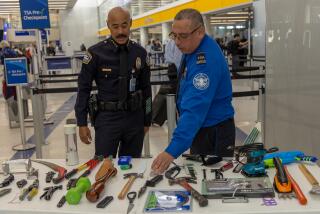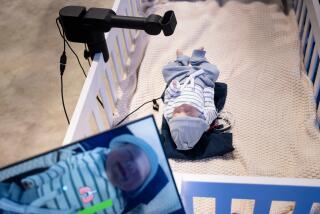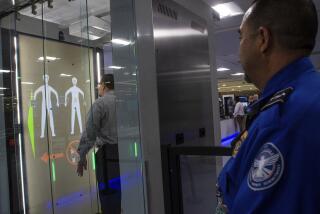Keeping your laptop safe on your travels
Travelers lugging laptop computers worry about losing them, with good reason. The hardware is worth hundreds or thousands, and lost or stolen data could be priceless.
But safeguarding your machine is no cinch.
Just ask Luke M. Ford, founder and chief executive of a tech-support company in Scottsdale, Ariz.
On a weekend jaunt last month to San Diego, he stashed his $1,400 laptop under a desk in his hotel room. When he returned 30 minutes later, it was gone. (His traveling companion had left the door open.)
Fortunately, Ford had encrypted his data and backed up his files on a remote website. He bought another laptop, and “by 9:18 a.m. Monday, my office team had my new computer working with all the data.”
It takes just a moment to lose your laptop. But by taking precautions, you can reduce the chances and minimize your losses.
Here are some tips from several experts, including Ford, of My Computer Works Inc., and the Transportation Security Administration, on keeping your laptop safe:
Tie it up; lock it up: Would you leave your wallet or purse in full view in your hotel room? So why do that with your laptop?
If Ford had secured his Dell to the desk with a security cable, which many newer computers have fittings for, he might still have it.
Travel incognito: Carry your computer in an inconspicuous bag, not one that screams, “I have a $2,500 piece of machinery in here!”
But don’t go entirely undercover. TSA employees suggest taping a business card to the bottom of your laptop or at least your name and phone. That helps anyone who finds your lost computer to return it .
Take care at airport checkpoints: Many laptops get lost or stolen there.
To thwart thieves, try to walk through the metal detector before your computer goes through the scanner. Retrieve it immediately.
“I actually wait until I’m the next guy to go through,” Ford said. “Then I slide my computer onto the conveyor belt. Frankly, I hold up the line.”
You may avoid some fumbling if you use what the TSA calls a “checkpoint friendly” laptop bag or compartment, which gives X-ray machines a clear view. For details on this new option, visit www.tsa.gov and search for “laptop.”
As with any valuable, never pack your computer in checked luggage.
Get password-protected: Require a password to log onto your laptop. It’s not foolproof, but it may thwart a casual data thief.
Be wary of wireless: Data may be vulnerable. “People are completely naive to the fact that when they are on a shared or public network, someone might access their data stream,” Ford said.
In a study released last month by Cornell University’s School of Hotel Administration in Ithaca, N.Y., researcher Josh Ogle said it took him just minutes to hack into transmissions on wireless networks in lobbies and restaurants at most of the 39 hotels he visited, using less than $100 worth of equipment he ordered on the Internet.
When you’re working wirelessly, avoid transactions that involve credit cards or other confidential information. If possible, use a virtual private network, or VPN, which encrypts data transmissions. Make sure your firewall software is current.
Don’t trust your neighbor: It doesn’t always take technology to steal passwords and other private data. Anyone sitting next to you in a hotel lobby or plane can steal a glance at your computer screen. Guard the view.
Go remote: Back up your files on discs, flash drives or websites so you can retrieve them if your laptop crashes or disappears. Many companies provide remote backup services for fees; Ford’s company, for instance, charges $9.95 per month.
More to Read
Sign up for The Wild
We’ll help you find the best places to hike, bike and run, as well as the perfect silent spots for meditation and yoga.
You may occasionally receive promotional content from the Los Angeles Times.






